
Today, 27 January, marks International Holocaust Remembrance Day, also known as Holocaust Memorial Day (HMD).
HMD has been observed since 2006, after the United Nations General Assembly in November 2005 adopted a resolution to commemorate the victims who died during the Holocaust.
Why is International Holocaust Remembrance Day celebrated on 27 January?
We celebrate International Holocaust Remembrance Day on 27 January as it coincides with the day in 1945 when Soviet troops liberated the Auschwitz concentration camp in occupied Poland.
Although many prisoners were sadly forced on a ‘death march’ in the days leading up to this date, around seven thousand were left behind – meaning that thousands could be freed and receive urgent medical attention.
Why is it important to commemorate International Holocaust Remembrance Day?
International Holocaust Remembrance Day is an important opportunity to remember the millions of people who were targeted between 1933 and 1945 and killed in concentration camps during the Second World War.
This includes six million Jewish people who tragically lost their lives during on-going anti-Semitic persecution. In total, two thirds of the entire Jewish population in Europe were killed – amounting to one third of the global Jewish population.
Around 10,000 to 15,000 men accused of homosexuality by the Nazi state were deported to concentration camps. There, many died of exhaustion due to the inhumane conditions but others underwent castration or were used in medical experiments.
Groups who were also targeted under Nazi rule include Roma, Sinti and disabled people, as well as Freemasons, Jehovah’s Witnesses, Polish and Slavic citizens, political opponents, trade unionists and other cultural or social minorities living in Germany and its occupied territories.
Commemorating International Holocaust Remembrance Day is a way of educating ourselves about the atrocities which took place under Nazi rule and to express our unwavering commitment to combating antisemitism, racism, homophobia, transphobia, xenophobia and any other form of discrimination.
How can I take part in International Holocaust Remembrance Day?
To mark the day, you can strengthen your understanding of the Holocaust by reading books or articles and watching and listening to resources about the events of 1933 to 1945. You may also light a candle or read aloud the names of the people who lost their lives.
In the UK, you can take part in International Holocaust Memorial Day by lighting a candle at your window at 8pm to remember those who lost their lives for simply being who they are and to stand against hatred and prejudice today.
Across the nation, six million candles will be lit in a digital display on billboards to mark the six million individuals who were killed in the Holocaust.